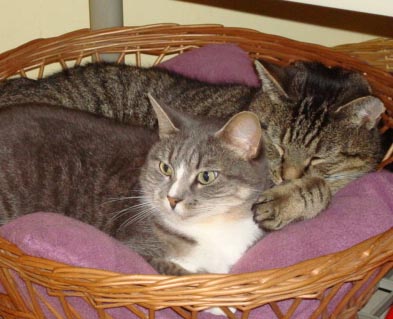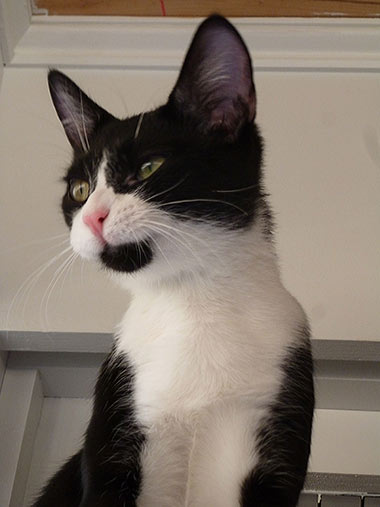


Surrendering a Cat
Before surrendering your cat, please consider the trauma of such a decision to the cat, and to members of your family. Sometimes surrender is unavoidable; however, many of our volunteers are knowledgeable about cat behavior and can help you solve some of the common problems that make people feel they must re-home their cats. Call our hotline - 508-540-5654 - to speak to a volunteer.
If you are moving
Please do not abandon your cat because you are moving. Plan ahead and start looking for an apartment where cats are welcome. If you can't take your cat with you, please call us as soon as possible as it can take weeks to get space at the shelter for your cat. Also, be sure your cat is up-to-date on vaccinations and is spayed or neutered.
If someone in the household has allergies
Being allergic doesn't mean that you can't have a pet or that you must give up one you already have. Even if your doctor finds that you have an allergy, don't give up your pet too quickly! Please visit the following web site, which has some great information about allergies and what you can do so you are able to keep your cat - Allerpet.com
If your cat has a behavioral problem
The shelter is unable to take in cats with behavioral problems that make them unadoptable. For advice on common problems, please call our hotline at 508-540-5654 or look at our Cat Owner Resources page.
Senior cats
A cat is usually classified as a "senior" when it is 10 years or older. It is best to avoid surrendering a senior cat, as it has usually lived in the same home for many years, and the stress of a shelter may be more than it can handle. Even with good care at our shelter, many senior cats will refuse to eat and develop liver disease or other serious problems. In addition, senior cats are very difficult to find homes for since most people are looking to adopt kittens or cats that they will have for a long time to come. If you have a senior cat that you absolutely cannot keep, the best thing you can do is try to place him/her directly into a new home.
Tips for placing your cat in a new home
A good way to start is to ask friends, family members, co-workers, neighbors, and everybody you know if they are willing to give your cat a home. If you have no luck, the next thing you should do is make up a flyer with an appealing, close-up picture of your cat and details about the cat's personality and the type of home it would do best in. Highlight your kitty's best qualities. Post this flyer at all the vets' offices in your area. The best pet owners can be found there and many people will see your flyers. You might also try posting the flyer at your work, gym, or church bulletin board. Do not advertise your cat as "free to a good home."
Another resource for placing your cat is Petfinder. Click on classified ads and you can post an ad for your cat. If someone responds, be sure to get - and check - a vet reference and ask for a small adoption fee. Ask questions about how they care for their pets, about the members of their household and other pets to help determine if this is a good match for your cat. Never resort to abandoning your cat or turning it loose. Cats cannot fend for themselves as many people think. It will not be able to find food or protection from predators. Call our hotline for advice; we will make every effort to help you avoid resorting to abandonment.
Surrender to PFC
If there is no alternative, you may apply to PFC to surrender your cat. Unfortunately, we can only accept applications from residents of Falmouth, Mashpee and Bourne and cats under the age of 10 years.
Once you have filled out a surrender application, you may take it to the shelter during public hours - Wednesdays, 4-6 pm and Saturdays, 10-1 and speak to a volunteer. Please note that we are restricted to a certain number of cats at the shelter and will do our best to help you re-home your cat. We have the most demand for space from July to December, so, if at all possible, we suggest you try to re-home your cat the first part of the year.
© People for Cats 2026
